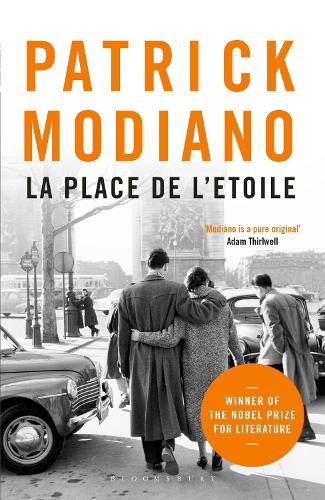
La Place de l'toile
(Paperback)
Publishing Details
La Place de l'toile
By (Author) Patrick Modiano
Translated by Frank Wynne
Bloomsbury Publishing PLC
Bloomsbury Publishing PLC
1st April 2016
United Kingdom
Classifications
General
Fiction
Physical Properties
Paperback
160
Width 126mm, Height 196mm, Spine 14mm
180g
Description
The first novel by the winner of the Nobel Prize for Literature 2014, which with The Night Watch and Ring Roads forms a trilogy of the Occupation 'A Marcel Proust of our time' Peter Englund, permanent secretary of the Swedish Academy 'Modiano is the poet of the Occupation and a spokesman for the disappeared, and I am thrilled that the Swedish Academy has recognised him' Rupert Thomson, Guardian Modianos debut novel is a sardonic, often grotesque satire of France during the Nazi occupation. We are immediately plunged into the hallucinatory imagination of Raphal Schlemilovitch, a young Jewish man, torn between self-aggrandisement and self-loathing, who may be the heir to a Venezuelan fortune, may have lived during the Nazi Occupation, may have rubbed shoulders with the most notorious collaborators and anti-Semites of the time, may even have been the lover of Eva Braun or he may have been none of these things. But at the centre of this vortex is La Place de ltoile the Place of the Star which is both the geographical and moral centre of Paris, and that place next the heart where French Jews were compelled to wear the yellow star, the symbol of their persecution.
Reviews
A Marcel Proust of our time * Peter Englund, permanent secretary of the Swedish Academy *
Modiano is a pure original * Adam Thirlwell *
From the satirical portrayal of anti-Semitism in his debut novel [La Place de ltoile] to later books such as The Search Warrant and Missing Person (winner of the 1978 Prix Goncourt), the Occupation shapes much of Modianos work * Boyd Tonkin, Independent *
Modiano is the poet of the Occupation and a spokesman for the disappeared, and I am thrilled that the Swedish Academy has recognised him * Rupert Thomson, Guardian *
Author Bio
Patrick Modiano was born in Paris in 1945 in the immediate aftermath of World War Two and the Nazi occupation of France, a dark period which continues to haunt him. After passing his baccalaurat, he left full-time education and dedicated himself to writing, encouraged by the French writer Raymond Queneau. From his very first book to his most recent, Modiano has pursued a quest for identity and some form of reconciliation with the past. His books have been published in forty languages and among the many prizes they have won are the Grand Prix du Roman de l'Acadmie franaise (1972), the Prix Goncourt (1978) and the Austrian State Prize for European Literature (2012). In 2014 he was awarded the Nobel Prize for Literature.
